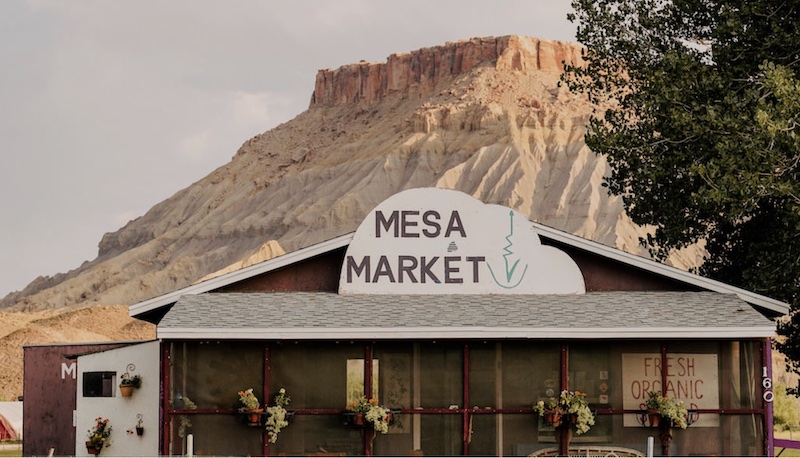Be Prepared!
I am not a prepper. In general, you’re not going to need it. It’s expensive and heavy, the people pushing it are probably ripping you off, and if something really bad happens you’re probably still hosed.
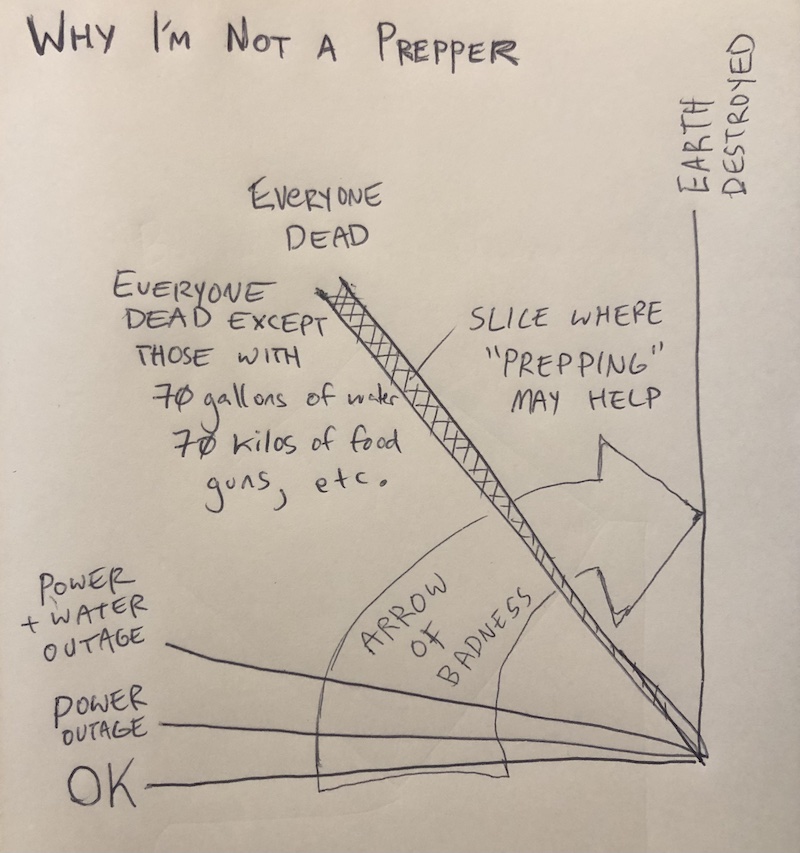
I’ve been a backpacker and a bicycle tourist. In both of these you are limited to about 40 pounds of stuff for your water, food, clothes, shelter, cooking, first aid, repairs. So you can literally weigh the eventualities you can prepare for. Think you may need to drink from a stream? Grab some chlorine tablets, that’s one ounce. Don’t want those chemicals building up in your body? A water filter is a whole pound. You have to make decisions. Among bicycle tourists I’ve noticed a scale between planning and resourcefulness. Some people make reservations at motels along the route. Some people sleep on the loading docks of Dollar General stores. Some download all the maps they will need in case they get out of cellphone coverage, and some just ask people for directions. Some arrange a ride through a tunnel that’s not safe for biking, where others stick out their thumb. I’m in the middle. I’ll flag down a pickup truck in a National Park and ask for a ride but I like having maps.
Part of my disinterest in survivalism is that my expectation of a post-apocalyptic future is influenced by some dark fiction. I’ve read The Road, and The Stand- all in all I’m just not sure I want to survive whatever initial catastrophe there is and then spend the rest of my days scrabbling around with all the maniacs. Let there be a bright white flash, THE END, roll the credits. But there is a whole industry around prepping, especially here in northwest Georgia. At my local grocery store (still in Metro Atlanta) there are six magazines dedicated to prepping; Outdoor Survival Guide, Off Grid, American Frontiersman, the Backwoodsman, Prepper, and Popular Mechanic’s Ultimate Survival Guide. Above that there are 14 gun magazines. There are also six fishing magazines which seems to indicate that locally people are as interested in prepping as they are in fishing.
North Georgia Prepper Magazines

I haven’t seen this in other parts of the country; only here in Georgia. I imagine that every other suburban town might have it too, or maybe it is unique to being close to Kennesaw, GA where every head of household residing in the city limits is required to maintain a firearm, together with ammunition. Maybe it’s something in the water here. They even sell these emergency food kits at my local Costco. It’s deceptive as 150 servings implies that you might live off this for 50 days, but the total calories is 24,260, which is food for about 12 days. Maybe 24 days if I’m just sitting around in a bunker, but the fantasy is that I’m going to be out fighting zombies in the post-apocalyptic future so I’m probably going to want 2,000 calories a day.
Emergency Food
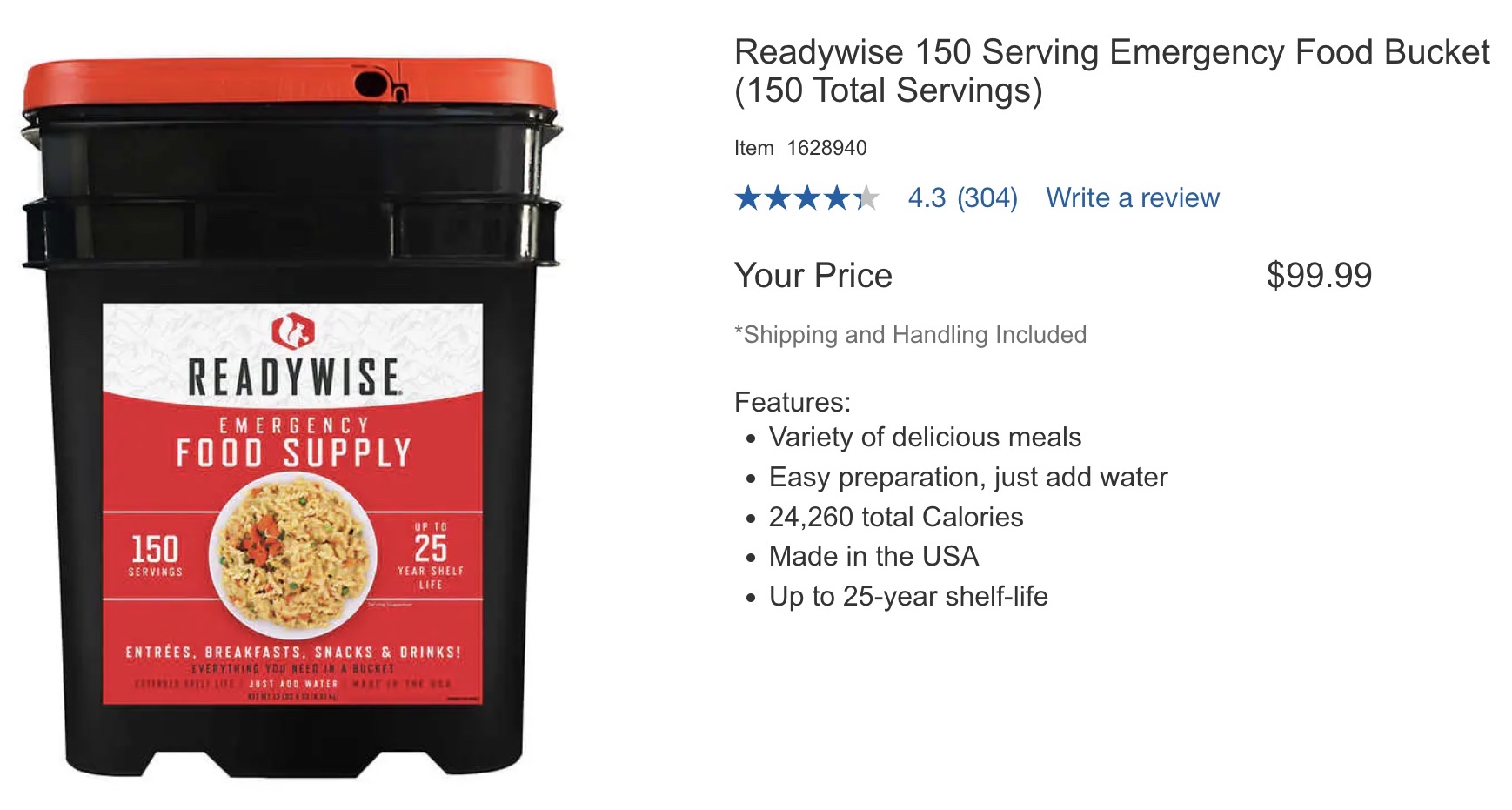
At any rate the “serving size” is going to be about 162 calories or so. $100 for 12 days of food which is mostly rice, pasta, and oatmeal is a little pricy, too, but you do get a sweet plastic bucket. Considering that the YETI bucket is $40, maybe a free plastic bucket is a great deal. There is even an entire prepper store in the area which looks like a one-stop shop for camping, survival, knives and firearms.
North Georgia Prepper Store
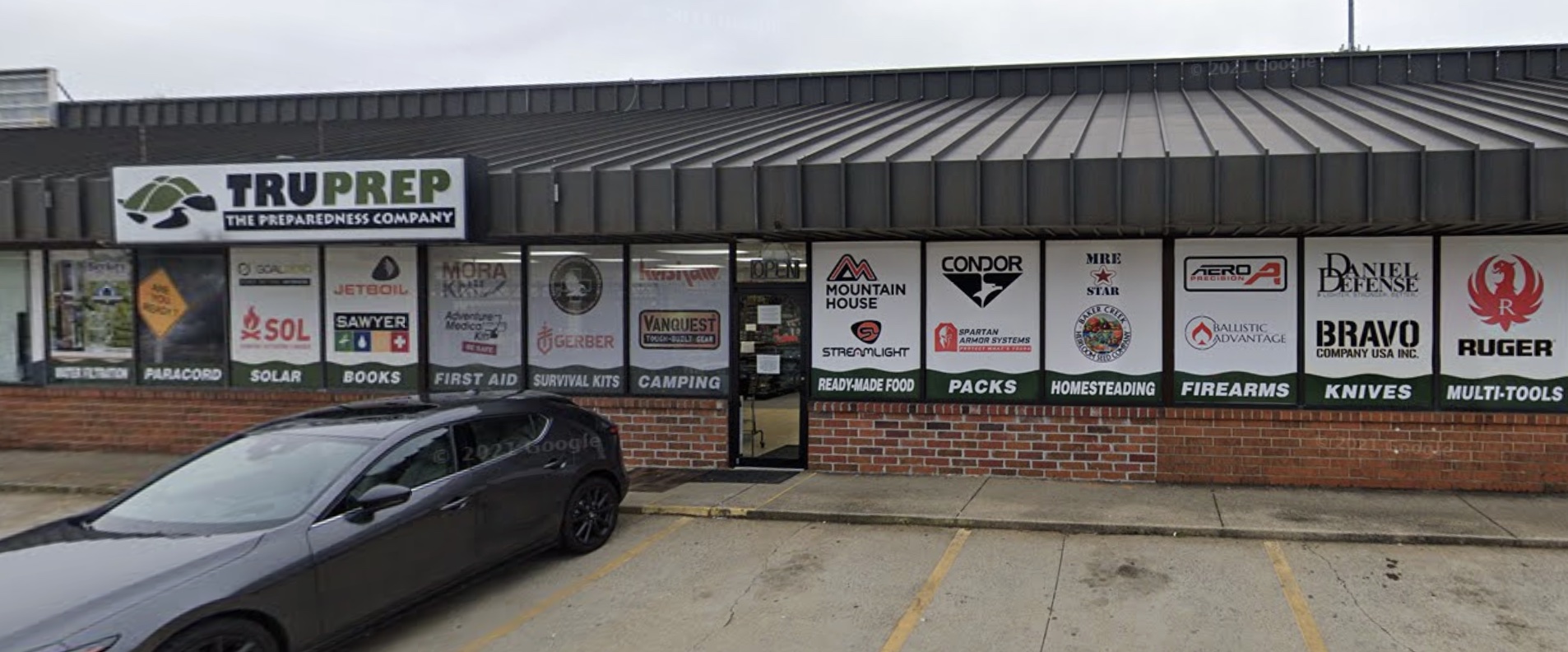
So what is going on here? Is it just that suburbanites can get their spouse to allocate more money in the budget if it’s for “preparedness” than for “outdoor stuff” or just “guns?” Have people conflated stockpiling survival gear in the basement with getting outside and camping? Is there a whole ecosystem of disinformation pushing theories of imminent societal collapse to sell crap to a population that’s lost all or never had any ability to think critically? Was the Bush Administration on the payroll of Big Duct Tape? Is “prepping” a way of imagining that I’m tough and ready for everything without the work of having to become physically fit? So many questions.
Besides, preparing for things which may happen in the future has a real cost today even beyond stockpiling overpriced grains. In software there is a theory You aren’t going to need it about not building anything until it is required. As Ron Jeffries said, “Always implement things when you actually need them, never when you just foresee that you need them.” Top chess players do this as well. Given enough time Magnus Carlsen will double check his analysis even when his opponent makes exactly the move he expected, because seeing the actual position on the chessboard is better than imagining it in the mind’s eye. The human mind can only hold a few things in its working memory, so you don’t want to let future problems distract from the problem at hand. It’s important to focus on the most pressing issue.
In finance as well a dollar is only worth a dollar if you can receive it today. Any payment you will receive in the future has to be discounted accordingly, because you could simply receive a smaller amount today and invest it. So spending time or money today to save time or money in the future is only a good plan if we first discount the future. This is true even before taking into account the chances of something in the future not happening. Every insurance company will be happy to sell you insurance against all manner of future risks that probably won’t happen, with payment due now.
It’s worth preparing for problems you expect; I carry Band-Aids. In each car, in each backpack. I have kids. It’s part of the parental contract that when kids play and fall down you’ll be ready to dust them off and give them a Band-Aid. I go mountain biking; for lack of a Band-Aid I’ve had to sacrifice a shirt to keep blood off the seats in my car after skinning up my knee. I don’t carry a compression bandage meant for treating a sucking chest wound (as my coworker in an Atlanta Fortune 500 company did, daily) as I’m not expecting shrapnel at the local playground. I carry a cellphone and a credit card. I’m not buying up gold, silver, ammunition or digital images of monkeys to get ready for the day when the U.S. government can no longer print money to pay its bills. On vacation I bring coffee, coffee filters, and a single cup dripper because not having coffee in the morning is a disaster for me, and you can’t rely on vacation rentals to have a working coffee system.
When Trump was elected my wife started asking about preparedness. She asked “What is your plan?” My plan for what? My general plan is that nothing is going to happen. Tomorrow will resemble today. After all the catastrophic predictions for Y2K on New Year’s Eve 1999 at midnight I was at the House of Blues in New Orleans. At 2 a.m. I asked the police for directions back to the New Orleans Youth Hostel. The only disaster I saw was that traffic was backed up on St. Charles Avenue so it wasn’t moving faster than a drunken pedestrian and I saw a driver who was receiving a Happy Y2K blowjob rear-end the car in front of him. There was no societal breakdown. The airbags didn’t even go off. I told my wife she could prepare all she wanted but the budget was $30/month. She bought 75 pounds of rice, twenty pounds of beans, and a water filter straw. When Covid came we started eating the emergency rice. We’re still eating it. No amount of parboiled rice in the house is protecting my kids’ future from the threat of Trump appointed judges- it’s just making it so we don’t have to go to the grocery store every week. We get risk wrong. We suffer from availability bias. We worry about what we can imagine.
Mesa Market Goat Farm and Bakery
Lack of preparation has bitten me in the ass. On my big bicycle tour I camped in Hite, Utah (basically a rock next to the Colorado River) with my only food some some olive oil and a loaf of bread from an organic goat farm in Caineville. The next day I thought that the gas station in Hite would be open so I could buy some food. It wasn’t, and I had to bike 80 miles to Blanding, all generally uphill with very little food. It was horrible. I might have given up and flagged down a car but there was very little traffic. When I got to the first gas station in Blanding I bought a Coke, Reese’s peanut butter cups, a Gatorade, a banana. I ate all of it and fell asleep on a bench in some sort of zero to 100 blood sugar coma. On another bike tour I thought there were water fountains on the Blue Ridge Parkway outside of Asheville, NC. There are not. I ran out of water and flagged down a car and begged a hot can of Diet Mountain Dew Red. It was delicious, and it powered me to the top of Mt. Pisgah where there were vending machines.
Hite, UT - A rock next to the Colorado River
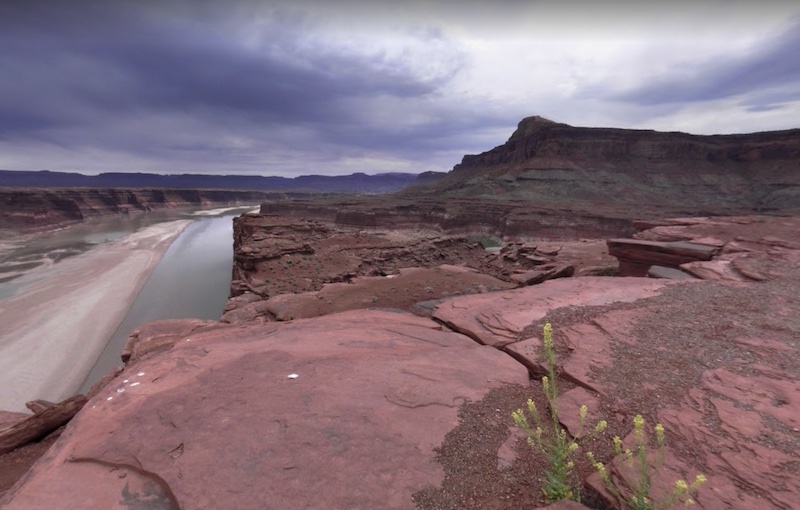
Now some of you are saying “Matt, I hear you but this is all just showing your privilege. People are nice to you. You can walk up to a house in the middle of Missouri and ask for water and they give you water. They’ll shoot me. I’m mixed race. When I tried to buy gas in the north Georgia mountains they didn’t offer me a Coke and tell me stories they pointed a shotgun at me and told me to get off their property. I’m not stopping a pickup truck, hitching a ride- I’m not leaving Atlanta.” OK, yes, that’s a valid criticism. In fact I may not have anything more to say. Maybe I am just social slacking and betting that people will help me if I get in trouble. But I’m not literally trying to make everyone into bike tourists. First of all just the bike shorts are a non-starter for many people. I get it. What I’m trying to say is that even for Magnus Carlsen it’s easier to deal with one actual problem than of the whole array of possible futures. As a good pool player would say, “First make the shot. Then worry about the next shot.”
When I was getting ready for my big bike tour, going from San Diego to New York, everybody had suggestions. Planning a trip like that you become a blank canvas for people to project their thoughts and fears onto. “Take a down jacket, it gets really cold at night in the desert.” “Take a gun, people are crazy out there.” “Take plenty of water, you won’t believe how much water you drink.” Of these only the one about water came from someone who had biked long distances, from a woman who had biked up the California coast to Washington each summer, in college. She was right. You will need more water than you think. That other stuff, you’re not going to need it.
